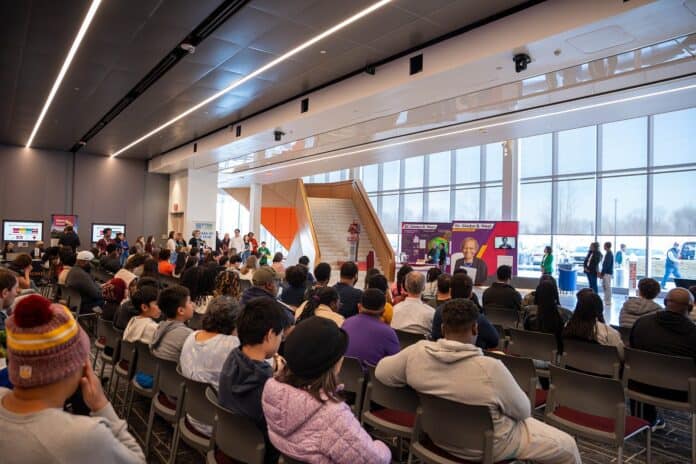Virginia Tech has been awarded a $4.5 million grant from the State Council of Higher Education for Virginia (SCHEV) to strengthen pathways to higher education for students across the commonwealth.
The one-year grant, awarded through SCHEV’s competitive statewide funding process, particularly aids those who would be the first in their families to attend college, or who qualify for federal Pell Grants.
The program supports multi-tiered programming designed to help K-12 students and their families engage early and meaningfully with college preparation and planning. It includes STEM workshops and field trips and financial and academic support for students as they transition to college. It exemplifies the aims of Virginia Tech Advantage, the university’s long-term commitment to offer the full educational experience to all students regardless of financial barriers.
With potential for renewal, based on the success of these programs, the initiative will build on Virginia Tech’s long-standing commitment to access and student success.
“This grant is a powerful affirmation of Virginia Tech’s demonstrated commitment to educational access,” said Karen Eley Sanders, associate vice provost for college access. “We’ve worked for years to support underserved and first-generation students because that’s who we are as a land-grant university. Our efforts aren’t just impactful, they’re embedded in the fabric of Virginia Tech.”
According to Sanders, Virginia Tech’s enrollment data shows steady growth in the number of students from low-income backgrounds and Title I high schools. “We’ve expanded our work from 24 to 30 partner schools across the state, most of which serve a majority of students receiving free or reduced lunch,” she said. “Once students arrive at Virginia Tech, the data show they succeed academically and graduate. That’s a testament to the programs and the people committed to this work.”
Early engagement through Virginia Tech’s D.C. area programming
A substantial portion of the grant will support K–12 programming at Virginia Tech’s new academic building in Alexandria. Led by Pamela Gilchrist, director of K–12 programs in the D.C. area, these initiatives will offer immersive learning in STEM fields.
“This is about empowerment,” Gilchrist said. “When students engage with robotics, drones, or data science in ways that feel exciting and personal, they start to believe that college – and careers in these fields – are within reach.”
The programming will include field trips to Virginia Tech labs, interactions with professionals in STEM careers, and hands-on workshops. Families also will be invited to participate in sessions on financial literacy, academic planning, and advocacy.
“We’re taking a holistic approach,” Gilchrist said. “We want parents and guardians to be part of the journey so they can better support their children. When the whole family understands the college process, it demystifies the path forward.”
Building a long-term talent pipeline
The initiative is designed to offer age-appropriate experiences that grow with students. For elementary students, that will mean early experiences and exploration. Middle schoolers will get hands-on STEM programs and academic enrichment, while high school students will participate in college planning, essay workshops, and career readiness opportunities.
“This kind of exposure can’t start in high school – it has to begin earlier,” Sanders said. “The idea is that students will grow up knowing about Virginia Tech, seeing themselves in our labs, and ultimately pursuing graduate degrees at Virginia Tech in the D.C. area. Then, they return to their communities, live and work there, and strengthen the commonwealth.”
A forward-looking investment
If renewed, the SCHEV grant could amplify Virginia Tech’s ability to close equity gaps and promote college-going cultures statewide. For now, the impact is already being felt, Sanders said.
“Ultimately, this is about ensuring that all students, regardless of background, can see themselves in college and know they belong,” Sanders said. “When that happens, it doesn’t just change individual lives. It uplifts entire communities.”
By Anne Kroemer Hoffman


